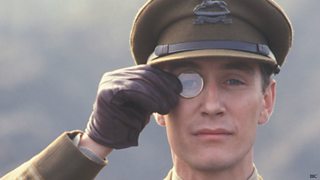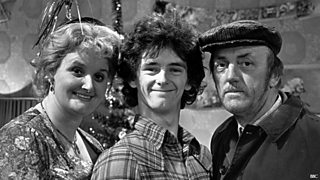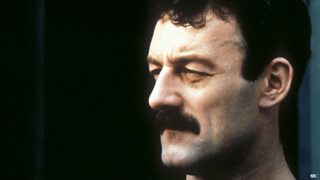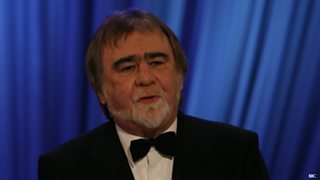
Percy Toplis (Paul McGann) in characteristic disguise as The Monocled Mutineer
“At home I was brought up on a literary diet of Chandler and Brian Rix, which may explain the way in which I write and what I think of life – as a sort of violent farce.”
Born in 1946 in Liverpool, Alan Bleasdale was part of a generation of dramatists who emerged in the 1970s, with the daunting task of following the explosion of talent during the preceding two decades, from the stage work and novels of the ‘Angry Young Men’ to the writers of TV’s Armchair Theatre and The Wednesday Play.
Bleasdale was the only child of working class parents. After grammar school he qualified as a teacher at the education college in Warrington, and began work at a Secondary Modern school in Liverpool in 1967. He later taught in the Gilbert and Ellice Islands (now Kiribati) in the Pacific Ocean, before returning to the UK in 1974. Apart from that period, he has always lived on Merseyside.
His first successful literary efforts were about a teenage anti-hero called Franny Scully, in a series of short stories. Submitting these to �������� Radio Merseyside, he was asked to read them on air. Continuing to write while in the Pacific, he only returned to teaching for a year afterwards before he was appointed a writer in residence at the Liverpool Playhouse, and later also worked at Manchester’s Contact Theatre, until 1986.
Scully was a popular character, and Bleasdale wrote a stage play and two novels of his adventures, then later a �������� Play for Today and a comedy series for Channel 4. In 1973 one of Bleasdale’s Scully stories featured in an edition of the ��������2 arts series , read by David Lincoln, as part of a special programme about the arts in Liverpool.
In 1975 Bleasdale had a half-hour play accepted for the strand Second City Firsts, , starring David Warwick and Alison Steadman. Second City Firsts was produced in Birmingham, part of the output of the English Regions Drama unit based there. Its head, David Rose, had a remit to find new authors from outside the metropolitan London area and thus widen the ��������’s drama horizons.
Early to Bed was Bleasdale’s only broadcast work for a few years, other than a couple of contributions to Radio 4’s slot. For the time being the stage dominated his workload, but that was to change towards the end of the 1970s. In 1978 he got a commission for a piece about his Scully character from the prestigious Play for Today strand, the flagship of one-off drama on ��������1, and successor to The Wednesday Play.

Jane Freeman, Andrew Schofield and Stan Stennett as the Scully family - celebrating the new year in an unusally chirpy Play for Today
was successful enough for him to be offered another edition of the series. Drawing on a business venture by members of his extended family, Bleasdale wrote a story about a gang of Liverpool tarmac workers who are sent by their boss to do on a job on Teeside – and decide to do another illicit job – a ‘foreigner’ – while they are there.
Originally called Down the Road Again, the play was eventually renamed after a workers' term for tarmac, . Though filmed in late 1978, it would be the early days of 1980 before it was scheduled for transmission – and then it was shown as a stand-along play, not as part of Play for Today.
Bleasdale’s characters were an appealing bunch, though there was a hard edge to the story that could have just been a comic romp. They were brought to life by an excellent cast – Michael Angelis, familiar to viewers as Lucian in Carla Lane’s sitcom The Liver Birds, played Chrissie Todd, the most humane and humorous of the group.
Other characters were played by Alan Igbon, Tom Georgeson, Peter Kerrigan, Gary Bleasdale, with Bernard Hill as a hard man called Yosser Hughes. Yosser, dressed in black with black hair and moustache, was a striking figure – literally in the sense that he was given to head-butt anyone who got in his way. In time he would turn out to be an iconic figure for the early 80s.
The play was an immediate hit, with a good critical response. It was repeated in the summer of 1981, and discussions were already underway to create a follow-up series, following Bleasdale’s own suggestion. When it was eventually transmitted, The Black Stuff had an impact unusual for a single play, and it was repeated in the middle of 1981. By this time work was well underway the sequel series, which would in time be titled .
At the end of the play, the gang had been sacked from their jobs and their illicit job ended in disaster when they were swindled – and so the dole loomed. In the series, each of the characters’ stories would unfold as they struggled with unemployment. After the Conservative election victory in 1979 joblessness was continuing its increase to levels not seen since the 1930s. Bleasdale wanted to examine the human cost, with his characters coping – or not – in their individual ways.
It had been intended that the same production team would also make the series, which would be called Boys from the Blackstuff, but delays in production caused by the small budgets available to English Regions Drama meant that original director Jim Goddard was not available. He was replaced by Philip Saville, a prestigious director whose career went back to ITV’s Armchair Theatre in the 1950s. David Rose had been producer of the one-off play, but he handed those duties over to Michael Wearing, as he had been made head of drama at the new Channel 4.

Bernard Hill in his era-defining role as the tragic figure of Yosser Hughes
Having already faced delays with the original play, there were to be similar problems with the sequels, with a degree of forward planning needed to enable the series to come to fruition. One of the scheduled plays, , was produced early. It starred Pete Postlethwaite and was broadcast in 1981, and is a powerful play in its own right.
That play was made on film as The Black Stuff had been, but it was intended that Boys from the Blackstuff would mostly be made on videotape, using relatively new lightweight outside broadcast equipment. As most of the new plays would use a relatively small number of locations each, it meant that a far quicker production schedule was possible.
As preparation continued on the now five-part series, Bleasdale was taken aback to find that his third episode, entitled Pulling the Plug Out, was not deemed satisfactory. This had never happened to him before, but he was able to respond to the knock-back and came up with one of his strongest episodes, which also helped redress the overly masculine balance of the series.
Another criticism of the original episode three was that it featured too many locations, and its replacement was confined to a smaller number of settings – most prominently the home of Chrissie. His antagonist in the drama was wife Angie, who would be played by the then relatively unknown Julie Walters.
For all the power of this episode, it was to be the next, that would be the most memorable. The only one of the plays to be made on film rather than outside-broadcast videotape, this was to be a tour-de-force not only from the pen of Bleasdale but also of the acting of Hill.
Yosser’s life is seen to fall apart completely. Unable to get any kind of job and deserted by his wife, his final breakdown is caused by the removal of his children. The use of film allowed the necessary large number of film locations to be achieved, with the drama being one of the highlights of 80s television.
Boys from the Blackstuff became an instant phenomenon with Yosser’s plaintive catch phrase ‘Gizza job’ becoming part of the soundtrack of the times. The series was repeated soon after, and on ��������1 instead of the original graveyard slot on Friday evenings on ��������2.

Liverpudlian writer Alan Bleasdale all dressed up with somewhere to go
Bleasdale had to follow that. It was suggested that he adapt a non-fiction work about a notorious First World War era deserter and fraudster, and alleged murderer Percy Toplis, but at first he declared that he did not do adaptations. Gradually he came round to the idea, and after the usual long process of production, four-part series was born.
In the series, in line with the original book, Toplis is seen progressing from petty crime to joining the army at the start of the War. Becoming involved in the mutiny at the Étaples training camp in 1917, he is doggedly pursued by an ambitious secret service man. Despite falling in love with a woman he meets while disguised as an officer, and trying to lie low in the post-war army, he is finally killed in a police ambush.
Accusations were levelled that The Monocled Mutineer, which had been perhaps rashly promoted as a true story, was not in fact so. Bleasdale had taken his cue from the original book, which puts forward the Toplis theory, but has since been shown to be on shaky ground.
Regardless of historical accuracy, The Monocled Mutineer remains an engaging story, with a fine central performance from the fresh-faced Paul McGann, not long after his debut starring role in snooker drama , and soon to become a cult hero in feature film Withnail and I.
Being an adaptation of an existing work, the structure of the series was more organised than Blackstuff, and showed another level of technique being acquired by Bleasdale. He was a go-to person for hard-hitting, challenging drama.
His later work tended not to be for the �������� as much. In 1985 he scripted the film , but a film career eluded him after this met limited success. Returning to television, one of his greatest series was , made for Channel 4 in 1991, and starring Michael Palin and Robert Lindsay in a plot that straddled local government corruption, a fear of motorways and bridges, and Dalek.
This was followed by the family drama Jake’s Progress for the same channel, and an ITV adaptation of Oliver Twist, which attracted criticism for adding to the established plot. Bleasdale also adapted the 1964 Francis Durbridge TV drama for Channel 4, but again it was very different from the source work and attracted some adverse reviews.
For a decade after that Bleasdale confined his writing to the stage, until returning to television in 2011 with the �������� drama , based on an incident in World War Two where a U-Boat captain defied his orders to rescue survivors from a ship he had sunk, which turned out to include a large number of civilians and Italian prisoners of war.
Bleasdale has had frustrations in his career – one major series he has worked on still awaits production, which is unlikely to happen now. Like many a writer he has perhaps suffered from expectations to live up to the heights of his early career, as well as from younger producers’ reluctance to employ writers from earlier eras, preferring to find new talent.
Even if we never hear from Bleasdale’s pen again, we still have a great body of work, and his masterpiece, Boys from the Blackstuff – as heartfelt and human a response to social conditions as we are ever likely to see.
What are your thoughts on the career of Alan Bleasdale? Should drama have something to say about modern times? Do you yearn for the era of the single drama, and the heavily authored series with ‘something to say’? We’d like to know, so tell us below…
